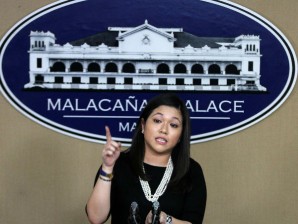Palace defends US military’s use of drones in ‘special cases’

Deputy presidential spokesperson Abigail Valte: Not the best way to do it. INQUIRER FILE PHOTO
MANILA, Philippines—While Davao City Mayor Rodrigo Duterte has rejected the launching of drones from his city, Malacañang on Friday defended the use of unmanned aerial vehicles (UAV) by the United States military in “special cases.”
Palace spokeswoman Abigail Valte declined to comment on the rejection by Duterte of the US government’s request to use the city’s old airport as base for the launch of drones.
“I am not very cognizant of what went on in that particular conversation,” Valte said at a news briefing.
But Valte said that the Philippines and the US shared intelligence information that was gathered by the drones in joint exercises. She said the drones were also used for humanitarian missions.
“I understand that they are, as said by the secretary of foreign affairs, used in special cases,” she said.
Article continues after this advertisementValte deferred to defense officials to respond to questions on whether Philippine laws are clear on the operation of drones in the archipelago.
Article continues after this advertisementDuterte rejected the request, made since his daughter was the city mayor, because he didn’t want “trouble and killings.”
The US Embassy explained that the US military deployed drones to assist in aerial surveillance for humanitarian and search-and-rescue operations, and only at the request of the Philippine government.
For instance, drones were deployed for an aerial survey of the devastation wrought by Typhoon Pablo in Mindanao last December and in the search for the missing plane of then Local Government Secretary Jesse Robredo in the waters off Masbate a year ago.
Several countries have raised concerns about the US deployment of drones in Yemen, Somalia, Iraq, Pakistan and Afghanistan to target suspected terrorists, arguing that some strikes have killed non-combatants.
In the US, at least eight states have enacted legislation to control domestic use of drones, citing privacy and safety concerns.
If used for combat operations in the country, the drones would violate the country’s Constitution, said Bobby Tuazon, director for policy studies of the Center for People Empowerment in Governance and a former head of UP Manila’s political science program.
“The VFA (Visiting Forces Agreement) does not allow combat operations by US forces,” Tuazon added in an interview.
In March 2012, President Aquino said that the Philippines allowed US drones to conduct reconnaissance flights over the country, but banned drone strikes.
Mr. Aquino said any drone attack would violate the ban on American troops taking part in combat operations.